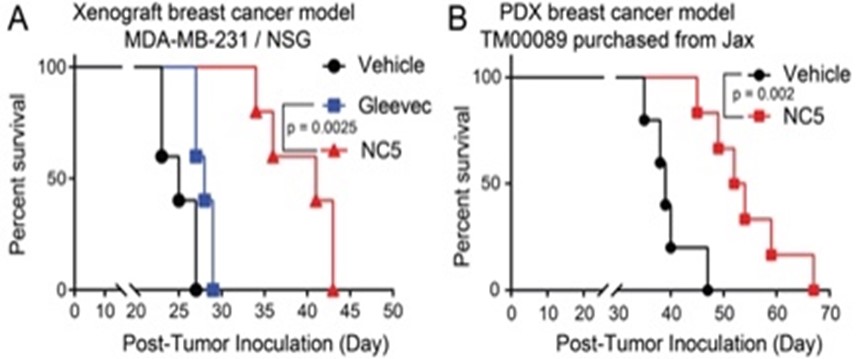
NC5 inhibits tumor growth and prolongs survival in vivo. NC5 treatment inhibits TNBC tumor growth and prolongs mice survival in xenograft and PDX mouse models. (A) Survival of mice bearing MDA-MB-231-Luc orthotopic xenograft tumors following treatment with vehicle (black line), Gleevec (blue line), or NC5 (red line). (B) Survival of mice bearing PDX TM00089 tumors following treatment with vehicle (black line) and NC5 (red line).
Invention Summary:
The Crk family of adaptor proteins are important as key players in tumorigenesis and immune responses. Phosphorylation of Crk proteins prevents the activation of natural killer (NK) cells and promotes the metastasis of tumors. Although the involvement and mechanism of how Crk is involved in cancer is well-characterized, there are no drugs that specifically target Crk proteins in cancer immunotherapy.
Rutgers researchers have identified a novel, chemically optimized compound that has the capacity to modulate Crk activation and, therefore, its activity. By filtering through several libraries of compounds, the researchers identified-NC5 and its optimized analogs based on its specific action on Crk and Crk-like (CrkL) but not upstream enzymes. The inventors confirmed the capacity of NC5 as a novel cancer therapeutic through a combination of in vitro assays and mouse models with cell-derived xenografts (CDX) and patient-derived xenografts (PDX). Their in vitro studies also show that NC5 treatment allows for proper immune response. Based on its capacity to block triple-negative breast cancer cell line (TNBC) proliferation and disease progression in in vivo models, NC5 and its optimized analogs show promise to be a novel therapeutic potential that targets the Crk pathway.
Market Applications:
- Treatment of cancers that involve the Crk pathway
- Potential as a therapeutic agent for other diseases that involve Crk activity
Advantages:
- In vitro and in vivo validation of NC5/its analogs as a cancer therapeutic
- Targeting of novel pathway for treatment of TNBC and other cancers
Intellectual Property & Development Status: Provisional patent application filed, patent pending. Available for licensing and/or research collaboration. Please contact marketingbd@research.rutgers.edu